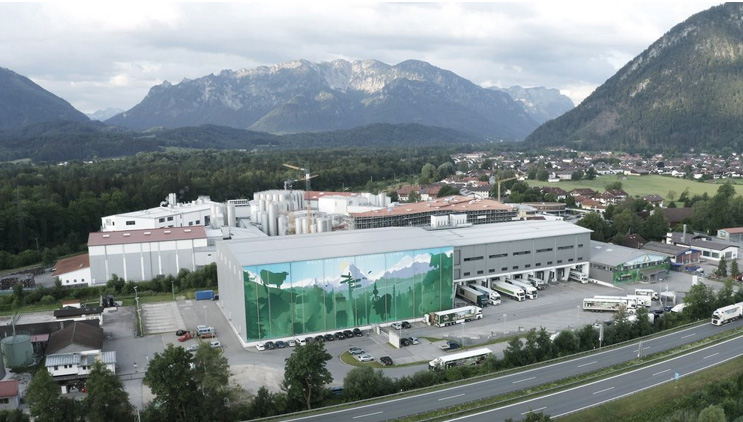Award-winning, sustainable dairy with a commitment to non-GMO

Published: August 12, 2024
Category: Non-GMO News
Berchtesgadener Land dairy has long been shaking things up in Germany! Founded in 1927, the mountain farmers’ co-operative has repeatedly attracted positive attention with its (at the time) “unorthodox” decisions such as its strong commitment to being non-GMO and organic. These principles have perhaps been key to the cooperative’s success. Based in Piding, Upper Bavaria, the dairy now counts over 1,600 farmers from across the region as part of its cooperative.
ENGA (European Non-GMO Industry Association) spoke to Bernhard Pointner, Berchtesgadener Land’s Managing Director, about the dairy, and its commitment to Non-GMO and sustainability.
In what way would you say that Berchtesgadener Land has been a “disruptor” in the German dairy market?
The first time the milk industry reacted with a shake of the head was 51 years ago, when the “Pidinger Molkerei” was the first dairy to consistently focus on organic milk – we started what turned out to be more than just a trend! With the separate collection of organic milk and the additional separate marketing channel started in 1988 as “Bergbauernmilch,” we established two solid pillars.
What about GMOs?
The fact that our cooperative has been 100% free of genetically modified animal feed since 2010 also underlines the dairy’s clear stance. The milk industry was also initially skeptical about this. Today, organic and “Non-GMO” quality are firmly established on the market.
The Berchtesgadener Land dairy’s organic range includes almost 50 products labelled with the Demeter and Naturland trademarks (in organic production GMOs are always excluded). In our conventional range with mountain and Alpine milk, 44 products bear the trademark for processing guaranteed without genetic engineering. Something that has always been a matter of course for our dairy was recognized in 2010 with the official “Without Genetic Engineering” label from the German government on the packaging.
How important are sustainability and environmental concerns to your business?
Mountain farmers’ milk has always been produced in harmony with nature—on small farms, using traditional methods and with a great deal of care for the animals and their welfare. First and foremost this includes the feed; our mountain farmers’ cows mainly eat fresh grass in summer and hay or grass silage in winter—the same pasture fodder, only naturally preserved. Feed is purchased exclusively from Europe. Our farmers from the mountain and Alpine region have never been and still are not fond of genetically engineered feed such as soy meal or rapeseed and it contradicts their and our understanding of natural, trustworthy milk production. The “Without Genetic Engineering” label on our mountain farm milk was therefore the logical consequence of what has always been a matter of course for us and our more than 1,600 members of our cooperative.
Our commitment to nature, to preserving the environment and its health is such a priority for us that it laid the foundation for winning the German Sustainability Award in 2019 and 2024.
What are the challenges facing your industry?
Food trends such as the trend towards milk substitutes, an oligopolistic trading landscape and a war in Europe, inflation and, as a result, a noticeable reluctance to buy among consumers all pose challenges. But milk has a future! Thanks to a healthy mindset and a considered decision-making culture, we are able to hold our own, even in times of crisis.
How can such challenges be overcome?
Current market conditions require a great deal of experience in the market, sound expertise and, above all, a long-term mindset that is not geared towards short-term profit skimming. But Berchtesgadener Land knows all about that. And we have laid the foundations for the future by investing 250 million euros over the last 12 years to expand the dairy into a highly modern site.
Source: European Non-GMO Industry Association
To view source article, visit:
https://www.enga.org/newsdetails/award-winning-sustainable-dairy-with-a-commitment-to-non-gmo/
Organic & Non-GMO Insights August 2024




